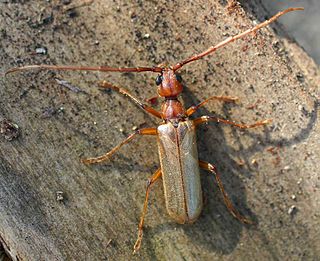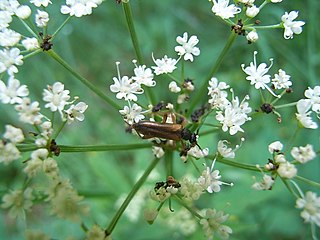
Lamiinae, commonly called flat-faced longhorns, are a subfamily of the longhorn beetle family (Cerambycidae). The subfamily includes over 750 genera, rivaled in diversity within the family only by the subfamily Cerambycinae.

The Vesperidae are a small family of beetles, normally classified within the family Cerambycidae, of heterogeneous aspect but all characterised by larval stages related to roots of herbaceous plants or trees

Cerambycinae is a subfamily of the longhorn beetle family (Cerambycidae). The subfamily has a world-wide distribution including: Asia, Europe and the Americas. Within the family, the only subfamily of comparable diversity is the Lamiinae.

Lepturinae, the lepturine beetles, is a subfamily of the longhorn beetle family (Cerambycidae), containing about 150 genera worldwide. This lineage is most diverse in the Northern Hemisphere. Until recently the subfamily Necydalinae was included within the lepturines, but this has been recently recognized as a separate subfamily. Nine tribes are usually recognized today, with a tenth, Caraphiini, created in 2016. A few genera are of uncertain placement within the subfamily.

Acanthoderini is a tribe of longhorn beetles of the subfamily Lamiinae. It was described by Thomson in 1860.

Anastrangalia is a genus of beetle in the family Cerambycidae, containing the following species:

Callidiini is a tribe of beetles in the subfamily Cerambycinae, containing the following genera:

Clytini is a tribe of beetles in the subfamily Cerambycinae, containing the following genera:

Graciliini is a tribe of beetles in the subfamily Cerambycinae, containing the following genera:

Pogonocherus hispidulus, the greater thorn-tipped longhorn beetle, is a species of flat-faced longhorns beetle in the family Cerambycidae.

Pogonocherus is a genus of flat-faced longhorn beetles in the family Cerambycidae.

Mallosia, described by Étienne Mulsant in 1847, is a genus of longhorn beetles of the subfamily Lamiinae, tribe Saperdini. It is distributed in the Palearctic, from Greece to Caucasus and Iran.
Dorcadion hampii is a species of beetle in the family Cerambycidae. It was described by Mulsant and Rey in 1863 from Turkey.
Dorcadion infernale is a species of beetle in the family Cerambycidae. It was described by Mulsant and Rey in 1863. It is known from Turkey.

Pogonocherus hispidus is a species of beetle in the family Cerambycidae. It was described by Carl Linnaeus in 1758, originally under the genus Cerambyx. It has a wide distribution throughout Europe and North Africa. It contains the varietas Pogonocherus hispidus var. rufescens.
Pogonocherus perroudi is a species of beetle in the family Cerambycidae. It was described by Mulsant in 1839. It has a wide distribution between Europe and North Africa. It feeds on several species of Pinus.

Menesia bipunctata is a species of beetle in the family Cerambycidae. It was described by Zoubkov in 1829, originally under the genus Saperda. It has a wide distribution in Europe and Asia. It measures between 6 and 9 mm. It feeds on Juglans regia and Frangula alnus.

Lepturini is a tribe of flower longhorns in the family Cerambycidae.

Alosterna is a genus of beetles belonging to the family Cerambycidae.














